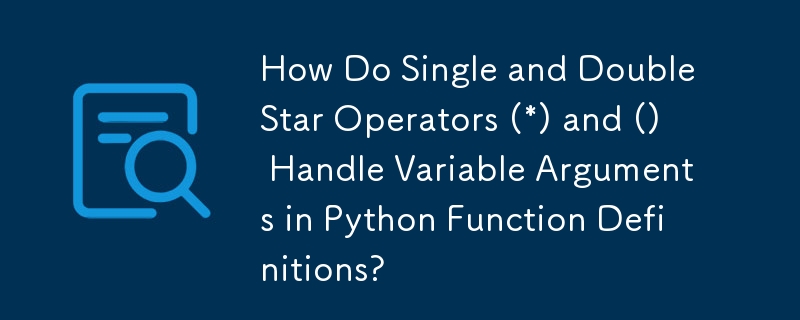

Parameter Unpacking: and in Function Definitions*
Function definitions in Python can leverage the (star) and * (double star) operators to handle varied numbers of arguments.
Single Star Operator (*)
The operator (also known as "var-args" or "splat") collects all positional arguments passed to the function into a tuple called args. For instance, in the definition below:
def foo(x, y, *args):
passIf args is invoked with foo(1, 2, 3, 4, 5), the args tuple will contain (3, 4, 5).
Double Star Operator ()**
The operator (also known as "var-kwargs" or "keyword splat") captures all keyword arguments as a dictionary named kwargs**. In the following definition:
def bar(x, y, **kwargs):
passWhen bar is invoked with bar(1, 2, name='Alice', age=30), the kwargs dictionary will contain {'name': 'Alice', 'age': 30}.
Mixing Standard and Variable Arguments
Function definitions can combine normal arguments with variable arguments using *:
def foo(kind, *args, bar=None, **kwargs):
passWhen invoked with foo(123, 'a', 'b', apple='red'), the variables 'kind', 'args', 'bar', and 'kwargs' will contain:
Unpacking Argument Lists
*: can also be used to unpack argument lists when calling functions:
def foo(bar, lee):
pass
baz = [1, 2]
foo(*baz) # Unpacks baz into [1, 2] for bar and leeExtended Iterable Unpacking (Python 3)
In Python 3, *l can be used on the left side of an assignment to unpack iterables into multiple variables:
first, *rest = [1, 2, 3, 4] # first = 1, rest = [2, 3, 4]
Keyword-Only Arguments (Python 3)
Python 3 introduces keyword-only arguments, where after *: only keyword arguments are allowed:
def func(arg1, arg2, arg3, *, kwarg1, kwarg2):
passThe above is the detailed content of How Do Single and Double Star Operators (*) and () Handle Variable Arguments in Python Function Definitions?. For more information, please follow other related articles on the PHP Chinese website!




